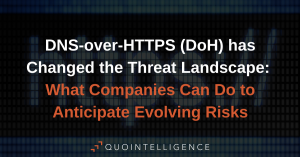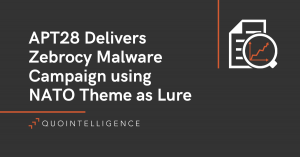
How DNS-over-HTTPS (DoH) has Changed the Threat Landscape For Companies
DoH provides the benefit of communicating DNS information over an encrypted HTTPS connection but presents security issues for organizations.

DoH provides the benefit of communicating DNS information over an encrypted HTTPS connection but presents security issues for organizations.

In occasion of the #SaferInternetDay2021, we prepared a compilation of Top 3 Digital Threats organizations and their leaders should be

Supply chain attacks are on the rise in 2021. The recent SolarWind breach and COVID-19 are only exacerbating supply chain

The Brexit transition period has ended. On 24 December 2020 the EU and UK reached the Trade and Cooperation Agreement

In the following blog post, we will provide an overview of the major cyber security trends observed over 2020 and

In this second blog post in our series on Geopolitics in Cyber Threat Intelligence, we will explain what is meant

The cyber-threat landscape increased significantly this year due to the COVID-19 pandemic caused by accelerated digitization and the sudden shift

QuoIntelligence and NVISO are pleased to announce they have formed a strategic partnership to enhance the cyber resilience of financial

Our declassified threat intelligence analysis on a APT28 spear phishing campaign delivering Zebrocy malware to target at least a government

In this blog, we explain how TIBER-EU tests are conducted and describe the role of the Threat Intelligence Provider in
Try searching our blog

Russian-Speaking eCrime Threat Actor Leverages Commercial AI Services to Compromise Over 600 FortiGate Devices | US Supreme Court Strikes Down Trump’s Global Tariffs

UNC6201 Exploiting Zero-day in Dell RecoverPoint to Achieve Persistent Access | Wave of Sabotage Acts Target Italian Railway Network Amid Winter Olympics

Exchange URL Rule Failure Sparks Mass Email Quarantine, ZeroDayRAT Spyware, SSH Botnets and DPRK LinkedIn Fraud Expand Global Threat Landscape | EU Launches 20th Russia Sanctions Package

APT28 Targeting Central and Eastern Europe through CVE‑2026‑21509 Exploitation | UK Opens First Investigations Over Breach Of Cyber Sanctions